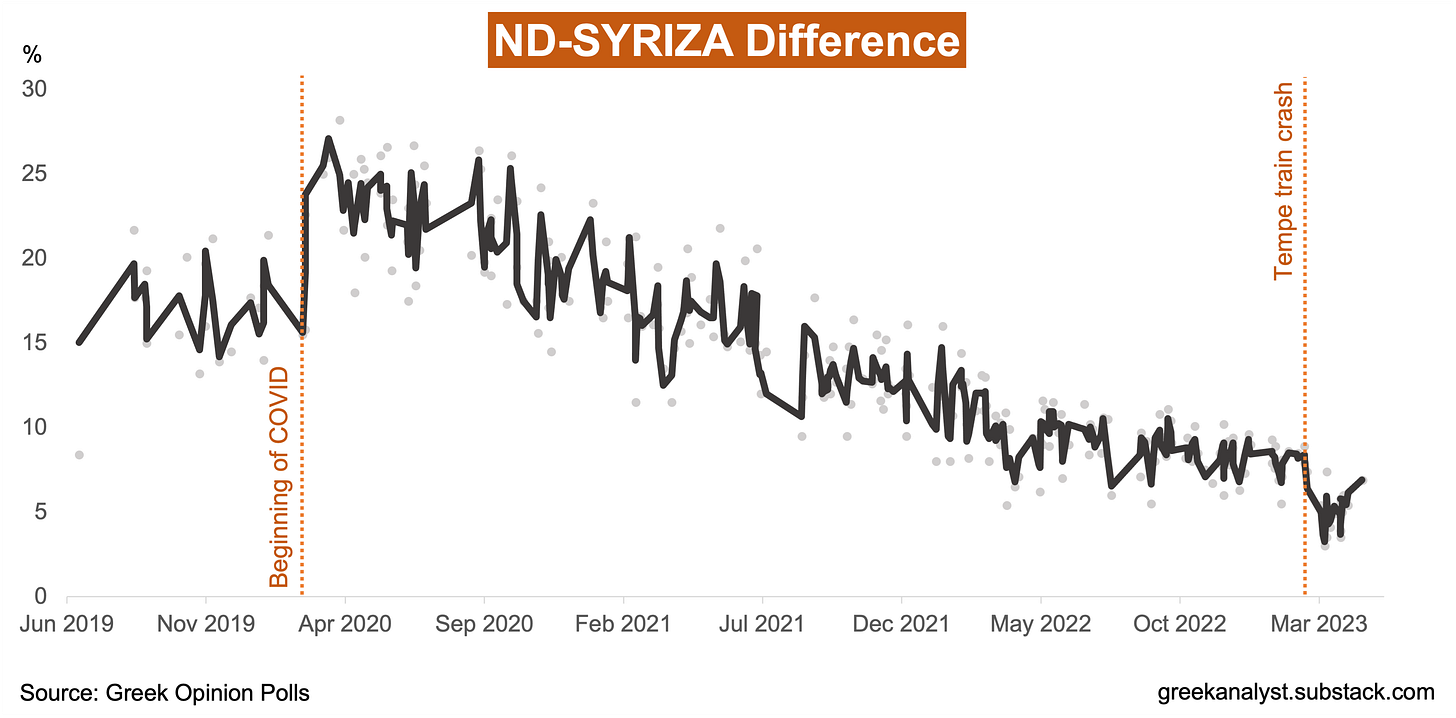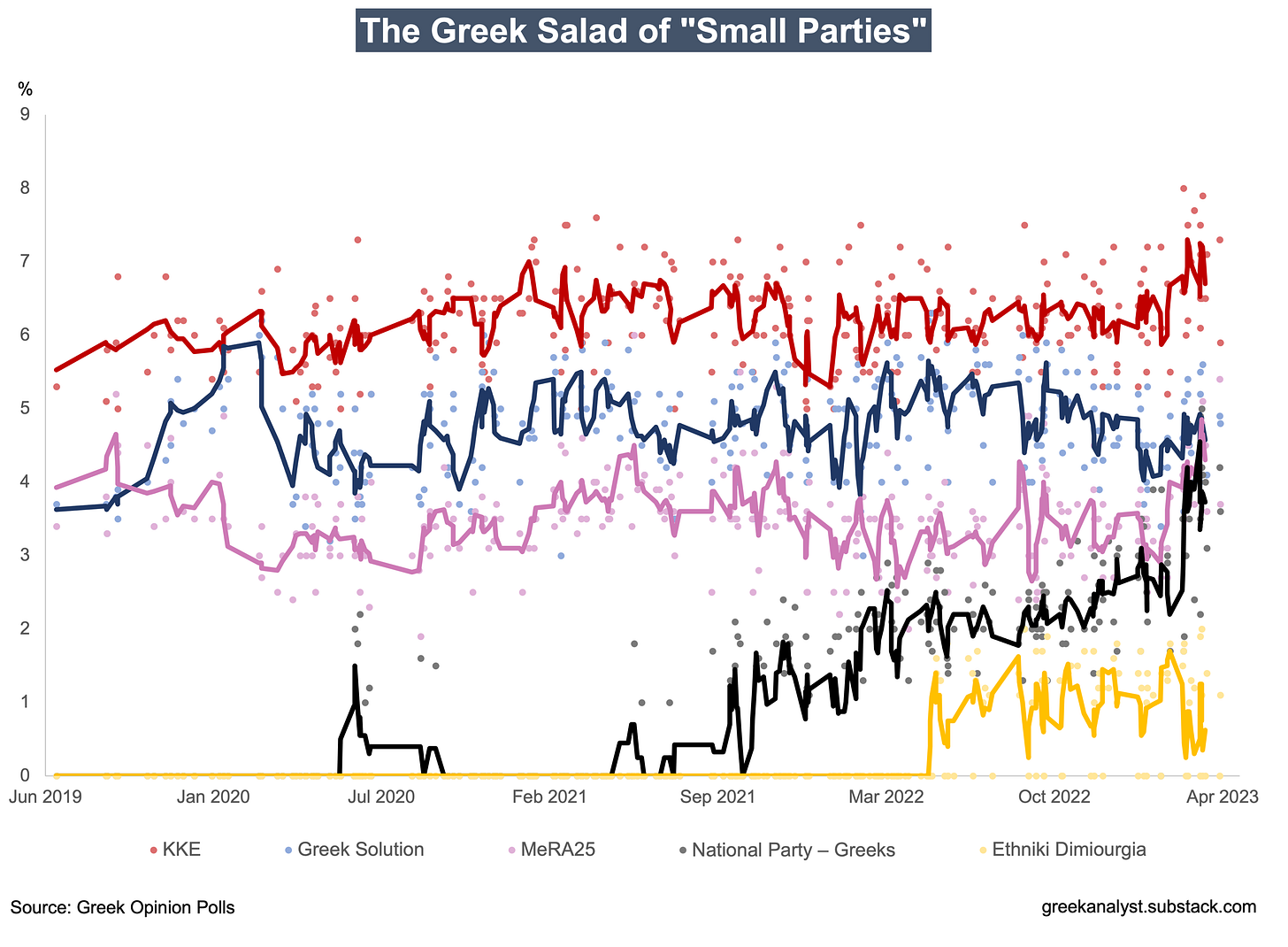Background
Greece’s next legislative election is set to take place on Sunday, May 21st, 2023.
What has initially looked as a smooth-sailing exercise and relaxed run for the center-right ruling party New Democracy (ND) has now become more of an actual derby between the incumbent and the radical left-wing opposition party Syriza - Progressive Alliance (SYRIZA).
In a repeat to the 2019 election, the liberal leader of ND and current PM Kyriakos Mitsotakis is once again set to square off against the firebrand leader of SYRIZA and former PM Alexis Tsipras. A lot has changed in the past four years in Greece, but the two leaders remain unchallenged and unflinching, with Mitsotakis consistently remaining the favorite political leader both against Tsipras as well as in comparison to all other party leaders.
There are five key facts to remember about this Greek election:
The Hellenic Parliament is comprised of 300 seats, all of which are contested during the country’s legislative elections. A majority of at least 151 seats is needed, either by one party or a coalition of them, in order to form a government.
The upcoming election will be run under an electoral system of proportional representation, a change introduced by the previous SYRIZA-led government. This makes it particularly difficult for any one party to win an outright majority.
If no government is formed, another election will be called shortly thereafter. In this follow-on election, the electoral system will be one of semi-proportional representation, as the current ND government has legislated back the old electoral model (which only comes in effect after one election with the existing model passes). This system will provide the leading party with 20 extra seats and favours larger parties (parties that get between 25% and 40% of the vote would receive one seat for every half % point in this range, up to 30 seats).
Any party needs to cross the 3% threshold in order to enter the parliament.
This is the first time in Greece’s history where Greek citizens will be able to vote from abroad, a new change introduced by the ND government hoping to energize the global Greek diaspora.
The Greek political party landscape in 2023
The list of parties running in the 2023 Greek legislative election is long. The most relevant ones are depicted below, together with their performance since the last legislative election in July 2019.
While centered around the two big parties, ND and SYRIZA, the Greek political party system today is actually quite fragmented, with many smaller parties in the fringes of both the extreme left and extreme right. The only exception is PASOK, the center-left party and third-wheeler in the polls, whose popularity shot up in early 2022 but has been steadily declining since then.
The fight for the top of Mount Olympus
In the 2019 legislative election, the electoral difference between winner ND (39.9%) and runner-up SYRIZA (31.5%) was about 8.4%.
At the beginning of the COVID era in 2020, that difference shot up to 28% in favor of ND (an all time high), a whopping number by all accounts that can be credited to the strong initial response by the government to the pandemic crisis.
This difference fell to almost 3% (an all time low) after the devastating train crash at Tempe, which saw a lot of public anger be directed against the Greek government for the confluence of institutional, political, organizational and human failings that could make such a tragic disaster possible.
Today, the polling difference between ND and SYRIZA has grown again, flunctuating between 6-7%.
This number does not provide a comfortable lead for ND in the upcoming election but could help it form a government if a follow-on election takes place right after with the semi-proportional representation system. SYRIZA seems to have accepted they are vying for 2nd spot, which is why they have been courting other parties and publicly making the case for different types of coalition governments led by them.
The rise and fall of PASOK
A curious peculiarity about this year’s election season is the renewed significance of the third party in the polls, (the once almighty) PASOK.
Following the untimely death of former PASOK leader and party favorite Fofi Gennimata, a new face from Brussels, Nikos Androulakis, won the party leadership race. The election of Androulakis at the end of 2021 brought a fresh interest in PASOK, which translated to an impressive spike in the polls at the time.
In the past year, PASOK’s polling resurgence has dissipated, as its new leader opted to remain in Brussels as an EU MEP rather than join the muddy waters of the domestic political scene. The party has also struggled to communicate a cohesive policy vision, with Androulakis often seen as not taking a clear stance on hot political issues.
PASOK used to dominate Greek politics for decades, but sharply lost its popularity during the financial crisis era, seeing the vast majority of its voting base move to SYRIZA. It has now assumed again the role of kingpin, holding the keys to a potential coalition government led by either ND or SYRIZA, a scenario that gives Androulakis a lot of latent power to exercise in the coming months.
The scramble at the Greek political periphery
It is not a coincidence that Greece’s political scene continues to fascinate foreign observers, social scientists and journalists. The country has one of the wildest set of characters leading parties across the entire political spectrum and ideological rainbow.
Let’s look at the most relevant Greek parties outside the Top 3:
KKE: The Communist Party of Greece, led by Dimitris Koutsoumbas, is probably the only constant in Greek politics. Everything else might change, but KKE will probably still be here, a remnant and continuous reminder of another era. KKE will certainly make it into the Greek parliament. In the 2010s, KKE was traditionally winning between 4-8% of the vote, down from 10%+ until the early 1990s. It is now polling at around 6-7%.
Greek Solution: A hardcore right-wing and ultra-nationalist party led by Kyriakos Velopoulos, a controversial character in both Greek politics and Greek TV. The religious, pro-Russia and “Greek First” elements are strong here and make for an interesting and feral juxtaposition. The party is polling at around 4-5% today.
MeRA25: Led by SYRIZA’s former Finance Minister and master(fully terrible) negotiator, Yanis Varoufakis, this is the radical left-wing local branch of the DiEM25 movement. You probably remember Varoufakis as the “game theory expert” who played the fate of Greece in cards and lost in 2015, leading to the closing of the Greek banks, the introduction of capital controls in the country and the prolongation of austerity. His theories might attract a lot of attention from unsuspecting foreigners, but most Greeks facing the consequences of his actions are no longer paying any serious attention. MeRA25 is polling between 3-5%.
National Party — Greeks: This is the far-right party led by Ilias Kasidiaris, former MP and spokesperson of Golden Dawn, the neo-Nazi political party that rose in popularity during the deepest end of the Greek financial crisis and whose leadership was charged and found guilty of running a criminal organization in 2020. Kasidiaris is currently facing a 13-year prison sentence as part of the same verdict and is somehow running a campaign from inside his cell. While legislative attempts have been made to hinder his efforts to run and enter parliament (as a member of a convicted criminal organization), Kasidiaris is looking for loopholes. The party is currently polling between 3-5%.
Ethniki Dimiourgia: Ethniki Dimiourgia literally means National Creation, and is the byproduct of a 2022 coalition between the libertarian Recreate Greece (led by Thanos Tzimeros) and right-wing New Right (led by Failos Kranidiotis) parties. The party places a very strong focus in reforming the Greek state, promotes a mix of free-market and conservative ideas, and has often communicated a strong anti-communist as well as anti-immigration stance. ED polls shy of 2%, but the number of undecided voters could potentially push it above the 3% threshold.
So, what comes next?
As with every pre-electoral period in Greece, tensions and promises are running high.
While the political climate can be described as highly toxic, with various parties and media weaponizing scandals (real or imaginary) to excite the masses, the reaction of the public has been characterized by a big *sigh* if not widespread apathy. This is reflected in the large number of undecided voters, a rarity so close to the elections.
The current political dynamics are highly fluid, and my guess about what happens next is as good as yours (and so is that of most pollsters and political analysts, so take any of their projections with a gigantic grain of salt).
One thing is for sure — this certainly won’t be a boring election, so buckle up!







